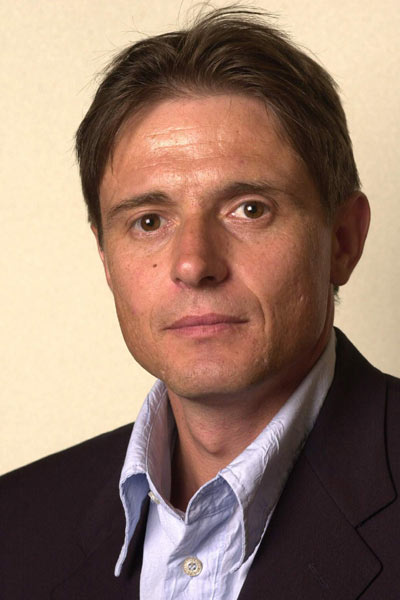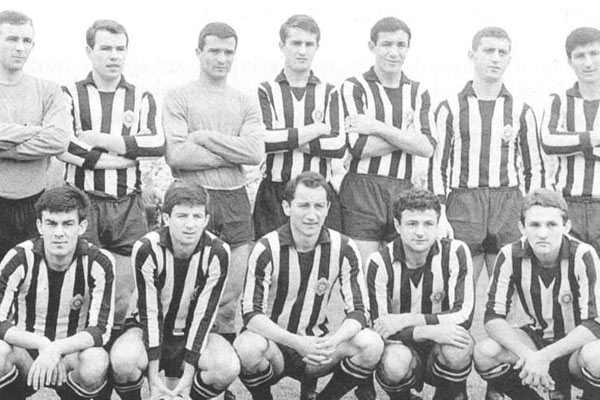Didn't know where to put this, so, I made a new thread about it. Uefa.com have a few articles on Serbian football, thought it was quite interesting for people to read...
![Image]()
The aim remains the same
Although the Football Association of Serbia and Montenegro (FSSCG) only acquired its name in 2003, its history remains unchanged. It was originally founded in 1919 as the Yugoslav Football Association, and FIFA and UEFA membership followed in 1921 and 1954 respectively.
Olympic medals
Yugoslavia played their first international match against Czechoslovakia at the Olympics in Antwerp on 28 August 1920, losing 7-0. However, major achievements were not long in coming as the country proceeded to participate in five Olympics and eight FIFA World Cups. They were silver medallists in London (1948), Helsinki (1952) and Melbourne (1956), bronze medallists in Los Angeles (1984) and Olympic champions in Rome (1960).
International record
They took part in the World Cup in Uruguay in 1930, reaching the semi-finals, in Brazil (1950), Switzerland (1954), Chile (1962, fourth place), Germany (1974), Spain (1982), Italy (1990) and France (1998), and have also appeared five times in the final round of the UEFA European Championship. Runners-up in both Paris (1960) and Rome (1968), they finished fourth in Belgrade in 1976 and also competed in France (1984) and Belgium/Netherlands (2000). However, Olympics apart, major honours have been the preserve of the youngsters.
Youthful endeavours
Yugoslavia's Under-21 side were European champions in 1978 and then triumphed in the International Youth Tournament a year later. More celebrations followed with victory at the 1987 FIFA World Youth Championship in Chile. On an individual level, the legendary Dragan Džajic held the record for international caps with 85 until overtaken by Savo Miloševic in October 2004, while Stjepan Bobek leads the goalscoring chart with 38.
European Cup success
Arguably the greatest international achievement by a Yugoslavian team has been FK Crvena Zvezda's victory over Olympique de Marseille in Bari in the European Champion Clubs' Cup final of 1991, when they won 5-4 on penalties after a 0-0 draw. Later that year Crvena Zvezda beat CSD Colo Colo of Chile 3-0 in the European/South American Cup in Tokyo. FK Partizan, also of Belgrade, had got close to realising European Cup success, reaching the 1966 final in Brussels only to lose 2-1 to Real Madrid CF. Both these clubs have also performed outstandingly in domestic competition.
Changing status
All these events have taken place against a backdrop of political flux. From 1919-41 Yugoslavia was a kingdom but in 1946 it became a republic and subsequently underwent several changes of identity. From 1946-63 it was the Federal People's Republic of Yugoslavia (FNRJ), then the Socialist Federal Republic of Yugoslavia (SFRJ), until it finally fragmented in 1992. In the latter period, the country consisted of six republics: Serbia, Bosnia and Herzegovina, Montenegro, Croatia, Macedonia and Slovenia.
Sporting sanctions
In 1992 the new state of Serbia and Montenegro was named the Federal Republic of Yugoslavia, and in the same year a United Nations resolution imposing sanctions on the country was extended to sport. Consequently, the national team was sent back from the EURO '92 finals in Sweden despite having qualified on merit, and for the same reason it was prohibited from taking part in the qualifying competitions for the 1994 World Cup and EURO '96™.
FSSCG mandate
On 10 February 2003 the Federal Republic of Yugoslavia changed its name once again to Serbia and Montenegro. Now the FSSCG, with its headquarters in Belgrade, is responsible for all football activities in the country and is an independent, democratic, non-governmental and politically and religiously neutral association.

The aim remains the same
Although the Football Association of Serbia and Montenegro (FSSCG) only acquired its name in 2003, its history remains unchanged. It was originally founded in 1919 as the Yugoslav Football Association, and FIFA and UEFA membership followed in 1921 and 1954 respectively.
Olympic medals
Yugoslavia played their first international match against Czechoslovakia at the Olympics in Antwerp on 28 August 1920, losing 7-0. However, major achievements were not long in coming as the country proceeded to participate in five Olympics and eight FIFA World Cups. They were silver medallists in London (1948), Helsinki (1952) and Melbourne (1956), bronze medallists in Los Angeles (1984) and Olympic champions in Rome (1960).
International record
They took part in the World Cup in Uruguay in 1930, reaching the semi-finals, in Brazil (1950), Switzerland (1954), Chile (1962, fourth place), Germany (1974), Spain (1982), Italy (1990) and France (1998), and have also appeared five times in the final round of the UEFA European Championship. Runners-up in both Paris (1960) and Rome (1968), they finished fourth in Belgrade in 1976 and also competed in France (1984) and Belgium/Netherlands (2000). However, Olympics apart, major honours have been the preserve of the youngsters.
Youthful endeavours
Yugoslavia's Under-21 side were European champions in 1978 and then triumphed in the International Youth Tournament a year later. More celebrations followed with victory at the 1987 FIFA World Youth Championship in Chile. On an individual level, the legendary Dragan Džajic held the record for international caps with 85 until overtaken by Savo Miloševic in October 2004, while Stjepan Bobek leads the goalscoring chart with 38.
European Cup success
Arguably the greatest international achievement by a Yugoslavian team has been FK Crvena Zvezda's victory over Olympique de Marseille in Bari in the European Champion Clubs' Cup final of 1991, when they won 5-4 on penalties after a 0-0 draw. Later that year Crvena Zvezda beat CSD Colo Colo of Chile 3-0 in the European/South American Cup in Tokyo. FK Partizan, also of Belgrade, had got close to realising European Cup success, reaching the 1966 final in Brussels only to lose 2-1 to Real Madrid CF. Both these clubs have also performed outstandingly in domestic competition.
Changing status
All these events have taken place against a backdrop of political flux. From 1919-41 Yugoslavia was a kingdom but in 1946 it became a republic and subsequently underwent several changes of identity. From 1946-63 it was the Federal People's Republic of Yugoslavia (FNRJ), then the Socialist Federal Republic of Yugoslavia (SFRJ), until it finally fragmented in 1992. In the latter period, the country consisted of six republics: Serbia, Bosnia and Herzegovina, Montenegro, Croatia, Macedonia and Slovenia.
Sporting sanctions
In 1992 the new state of Serbia and Montenegro was named the Federal Republic of Yugoslavia, and in the same year a United Nations resolution imposing sanctions on the country was extended to sport. Consequently, the national team was sent back from the EURO '92 finals in Sweden despite having qualified on merit, and for the same reason it was prohibited from taking part in the qualifying competitions for the 1994 World Cup and EURO '96™.
FSSCG mandate
On 10 February 2003 the Federal Republic of Yugoslavia changed its name once again to Serbia and Montenegro. Now the FSSCG, with its headquarters in Belgrade, is responsible for all football activities in the country and is an independent, democratic, non-governmental and politically and religiously neutral association.










